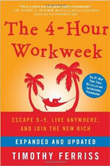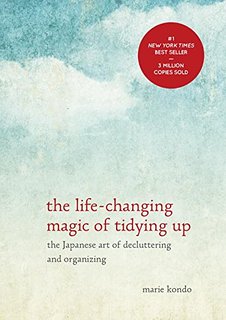Review: The 4-Hour Workweek
September 5, 2011 - David McConkey
The
4-Hour Workweek: Escape 9-5, Live Anywhere, and Join the New Rich by Timothy
Ferriss is a great book.
The book is mainly a manual for using the new technologies – especially
the Internet – to live like the title of the book. (Yes, actually
support yourself by working just four hours a week.) And I do think
that the
book is an excellent source for such information. But likely, few are
going to have the skills and chutzpa to actually pull off this feat.
(Ferriss downplays what a special person he is, and that few others are
really like him.)
But that doesn’t even matter.
 This book has super ideas for anyone who
would like to supplement their income from their job, make their
finances more secure by diversifying their income, take a sabbatical
from their regular work, ease out of regular working into
semi-retirement, add more zest to their retirement years, or just make
their lives more interesting.
This book has super ideas for anyone who
would like to supplement their income from their job, make their
finances more secure by diversifying their income, take a sabbatical
from their regular work, ease out of regular working into
semi-retirement, add more zest to their retirement years, or just make
their lives more interesting.
In short, there is a wealth of good ideas in this book, to make
anyone’s life a bit (or a lot!) more intentional, satisfying, and fun.
Here are some examples:
Think Outside
the Box
His whole premise is to manage an alternative to regular life, which as
he points out, is often far from rewarding. He offers an option to
the existence of so many: spend your best hours and years in
unsatisfying labour and defer meaningful living until later (or, often,
never). If you are OK with that, don’t bother looking at the book.
“I’m not going to spend much time on the problem,” he begins. “I’m
going to assume you are suffering from time famine, creeping dread, or
– worst case scenario – a tolerable and comfortable existence doing
something unfulfilling. The last is most common and most insidious.”
Get What You
Want
The book is inspirational: we don’t have to be content with the normal.
“Reality is negotiable,” he says. “Outside of science and law’ all
kinds of rules can be bent or broken, and it doesn’t require being
unethical.”
Make Money
Using New Technologies
Ferriss has much detail and sources of information for using the new
technologies to make money. Many of these ideas revolve around
money-making websites, but there are many others as well. These include
everything from outsourcing your work overseas to tapping into
companies that will manufacture any product that you can then market.
Travel More
Travel is one thing that many people say they would like to do more of, if only . . .
But even if you don’t have a lot of time or money, Ferriss has many great
thoughts, from packing more efficiently to getting the most of the experience other
cultures. He is especially encouraging for those who have the time, but
not the money. Many adventures, he points out, can be had for little
cash.
Don't
put off your dreams because you think you first have to save up a big
pile of money, or be permanently retired, he says, "If your dream, the pot at
the end of the career rainbow, is to live large in Thailand, sail
around the Caribbean, or ride a motorcycle across China, guess what?
All of them can be done for less than $3,000. I've done all three."
Take a Break
From Work
“Why not take the usual 20-30 year retirement,” he asks, “and
redistribute it throughout life instead of saving it all for the
end?”
Many people would like to take time off from their regular job, but are
afraid to, for one reason or another. Ferriss dismisses most of these
reasons as simply excuses, and tries to instill confidence in anyone to
“just go for it.” That month or year off from your regular job
(“mini-retirements”) may give you a renewed enthusiasm for living, or
even inspire you to never go back to the old routine.
But won’t taking a year or two off “ruin my resumé”?
Make your resumé stand out, he advises, by adding what you did in your
time off. And when you get interviewed, he says, “interviewers bored in
their own jobs will spend the entire meeting asking you how you did
it!”
“Do something interesting and make them jealous,” he concludes. “If you
quit and then sit on your ass, I wouldn’t hire you either.”
Consider Odd
Insights
Here is one of his ideas that could get anyone thinking: “You are the
average of the five people you associate with most, so do not
underestimate the effects of your pessimistic, unambitious, or
disorganized friends. If someone isn’t making you stronger, they’re
making you weaker.”
Be More
Efficient
If you are going to earn your living by working just four hours a week,
you are going to need to be efficient, a lot more efficient. And there
are loads of suggestions to make anyone’s life more efficient. One idea
that got me thinking is not spending the time reading a newspaper or
watching news on TV. Other ideas involve decluttering and making phone
calls and e-mails much more productive. (One tip: don’t check e-mail
first thing in the morning, instead concentrate first on your most
important tasks at hand.)
Enrich Your
Life
The most interesting chapter in the book for me was “Filling the Void.”
Of course, he asks the question in the context of those who are able to
make their living on just four hours per week: Just what do you do with the
rest of your time? But the question is also appropriate for those who
are taking time off from work, those who are retired, and even for
those who wonder how best to use their non-work hours.
Ferriss has a number of thought-provoking observations about questions
like “What is the meaning of life?”
His short answer to a meaningful life is two-fold: to learn and to
serve. And, like the rest of the book, he provides numerous good
suggestions for more information on both learning and serving (in other words, making the world
a better place).
As for learning, he has a special interest in learning
languages, which he describes as “the best thing you can do to hone
clear thinking.” And, again, he is so encouraging; he describes himself
as learning six languages after failing Spanish in high school.
And for service, he neatly answers the question many have: How can I
know the best thing to do as the world seems so complicated? “Do your
best and hope for the best,” he says. “If you are improving the world –
however you define that – consider your job well done.”
And don’t think that your efforts are more worthy than someone else’s.
“Do not become a cause snob.”
“Find the cause or vehicle that interests you most and make no
apologies.”
See also:
The
4-Hour Workweek on Amazon.ca (on
Amazon.com
)
Deepening Our Thinking in the Internet Age: Ten Tips
The Bathrobe Millionaire - Review
Blog of author Timothy Ferriss
Popular Right Now:
- 15 Tips for Healthy Eating
- Quality of Life, Well-Being Research Something We Can Feel Good About
- Diets Don't Work, So What Does?
- Political Contributions: Top Ten Canadian Tax Tips
- Nestle Fitness 14 Day Weight Loss Program; What is Wrong Here?
- Charitable Donations: Top Ten Canadian Tax Tips
Must Read Books:
The 4-Hour Workweek:
Escape 9-5, Live Anywhere, and Join the New Rich

What You Don't Know About Religion (But Should)

In Defense of Food:
An Eater's Manifesto

The Life-Changing Magic of Tidying Up:
The Japanese Art of Decluttering and Organizing

Don't
Even Think About It:
Why Our Brains are Wired to Ignore Climate Change

Like This? Share It!
Press Ctrl + D to Bookmark!
